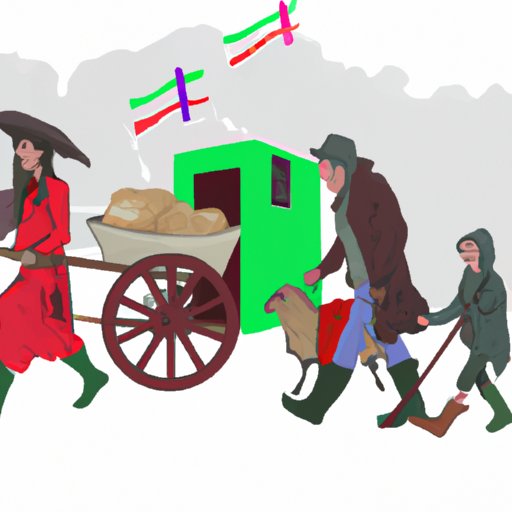Introduction – What is an Irish Traveler?
Irish Travelers are a traditionally itinerant people who have been living in Ireland for centuries. They are a distinct ethnic group with a unique culture and language, and have been labeled as “travelers” due to their nomadic lifestyle. While Irish travelers have faced discrimination and social exclusion throughout their history, they continue to make valuable contributions to Irish society.

Exploring the History and Culture of Irish Travelers
The origins of Irish travelers can be traced back to the 16th century, when they were known as “tinkers” or “gypsies.” They lived an itinerant lifestyle, traveling from place to place to earn a living through various trades such as metalworking, horse dealing, and fortune telling. This lifestyle has been passed down through generations, and today Irish travelers continue to live a nomadic existence.
Irish traveler culture is distinct from mainstream Irish culture in many ways. The traveler’s traditional language, Shelta, is derived from a combination of Irish Gaelic and English. They also follow a strict code of honor known as the “traveller’s point,” which is based on respect for family and community. Additionally, Irish travelers have a strong oral tradition and are well-known for their storytelling.

Investigating the Unique Lifestyle of Irish Travelers
Irish travelers maintain a nomadic lifestyle, traveling from place to place in search of employment. This lifestyle has evolved over time, with some travelers settling in one area while others remain more itinerant. Despite this, most Irish travelers still move around regularly in order to find work.
The modern world has had a significant impact on Irish traveler culture. With the rise of technology and the growth of global markets, it has become increasingly difficult for Irish travelers to find traditional forms of employment. This has led to high rates of poverty and homelessness among Irish travelers, as well as increased pressure to assimilate into mainstream society.
Examining the Social Issues Facing Irish Travelers
Irish travelers have long faced discrimination and social exclusion in Ireland. This discrimination is rooted in negative stereotypes about travelers, such as the belief that they are lazy or prone to criminal activity. In recent years, there has been a renewed focus on the plight of Irish travelers, with the government taking steps to address the issues they face. However, much more needs to be done in order to ensure that Irish travelers are treated with respect and dignity.
Integrating into mainstream society can also be challenging for Irish travelers. Many travelers struggle to find employment due to discrimination, and educational opportunities are often limited. As a result, many travelers feel marginalized and excluded from society.
Looking at the Challenges of Being an Irish Traveler
Maintaining a traditional lifestyle in a modern world can be difficult for Irish travelers. As their traditional forms of employment have become less viable, travelers have had to find new ways to make a living. This has led to increased reliance on welfare benefits, which can be difficult to access due to language and cultural barriers.
Poverty and homelessness are also major issues facing Irish travelers. According to a recent study by the Irish Human Rights Commission, nearly two-thirds of Irish travelers live in poverty, and one-third of travelers are homeless. The lack of affordable housing and inadequate government support have contributed to these high levels of deprivation.

Celebrating the Contributions of Irish Travelers to Irish Society
Despite the challenges they face, Irish travelers have made valuable contributions to Irish society. Their culture is rich in music and storytelling, and their art has been featured in museums and galleries across the country. Irish travelers have also demonstrated remarkable resilience and perseverance in the face of adversity, and their culture continues to thrive despite the difficulties they have encountered.
Understanding the Impact of Irish Travelers on Modern Ireland
Irish travelers have a unique role in contemporary Irish society. While they continue to face discrimination and social exclusion, they have also made important contributions to Irish culture and identity. In recent years, there has been an increased focus on the rights and recognition of Irish travelers, and the government has taken steps to address the issues they face.

Conclusion – Summary of the Article and Final Thoughts
This article has explored the history, culture, and impact of Irish travelers on modern Ireland. It has demonstrated that Irish travelers are a distinct ethnic group with a unique culture and language, and have faced discrimination and social exclusion throughout their history. Despite this, they have made valuable contributions to Irish society and continue to demonstrate remarkable resilience and perseverance in the face of adversity. While much more needs to be done to ensure that Irish travelers are treated with respect and dignity, it is important to recognize and celebrate their contributions to Irish culture and identity.
(Note: Is this article not meeting your expectations? Do you have knowledge or insights to share? Unlock new opportunities and expand your reach by joining our authors team. Click Registration to join us and share your expertise with our readers.)
